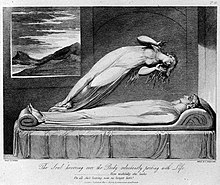
Back Nyaw'ong ACE Siel Afrikaans Seele ALS ነፍስ Amharic Alma AN आत्मा ANP نفس Arabic আত্মা Assamese Alma AST Ajayu Aymara

The soul, regarded as the immaterial self which most ordinary people initially believe in,[citation needed] is often discussed in the context of religion, theology, psychology and philosophy.[1][need quotation to verify] According to Stewart Goetz, anthropologists and psychologists have found that ordinary humans interculturally have distinguished between souls and bodies.[2]
The soul may also be considered to be the animating force ("spirit") of a person,[3] including that person's personal identity, personality, or memory. Many people believe that a soul (an immortal soul), as an immaterial aspect of a living being, can survive physical death. In the Judeo-Christian tradition the concept of a soul generally applies only to humans, although other worldviews, such as animism, may assign souls to other living[4] and non-living entities.[5][6]
- ^ Goetz, S. (2016) Soul. In Vocabulary for the stury of religion Brill
- ^
Goetz, Stewart (2015). "Soul". In Segal, Robert Alan; von Stuckrad, Kocku (eds.). Vocabulary for the Study of Religion, Volume 1. Brill. ISBN 9789004290433. Retrieved 10 January 2025.
According to anthropologists and psychologists, ordinary human beings at all times and in all places have believed in the existence of a distinction between the soul and the body. Ordinary human beings are soul-body substance dualists.
- ^ "soul". Britannica. Retrieved 10 January 2025.
Among ancient peoples, both the Egyptians and the Chinese conceived of a dual soul. The Egyptian ka (breath) survived death but remained near the body, while the spiritual ba proceeded to the region of the dead.
- ^ "soul". Britannica. Retrieved 10 January 2025.
Many cultures have recognized some incorporeal principle of human life or existence corresponding to the soul, and many have attributed souls to all living things.
- ^
Kieschnick, John (16 June 2020) [2003]. "Sacred Power". The Impact of Buddhism on Chinese Material Culture. Buddhisms: A Princeton University Press Series. Princeton, New Jersey: Princeton University Press. p. 25. ISBN 9780691214047. Retrieved 10 January 2025.
[...] E. B. Tylor [...], popularized the concept of 'animism,' the belief that a phantom-like soul inhabits all things. [...] Tylor proposed that humans in their primitive state explained the presence of inanimate objects in their dreams by attributing souls to objects as well.
- ^
Sha, Zhi Gang (7 September 2010) [2006]. Soul Mind Body Medicine: A Complete Soul Healing System for Optimum Health and Vitality. Novato, California: New World Library. p. 25. ISBN 9781577317746. Retrieved 10 January 2025.
Thousands of years ago, ancient Chinese spiritual teaching held that everything, including inanimate things, has a soul.